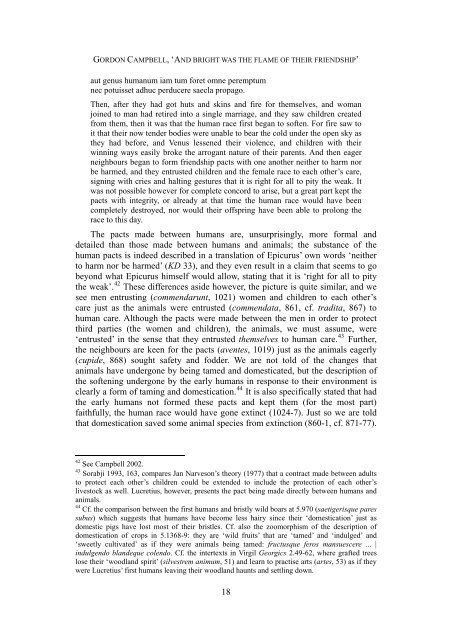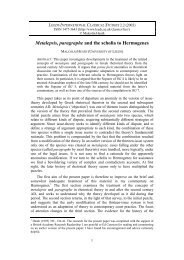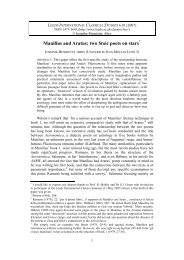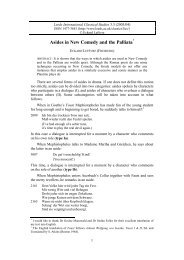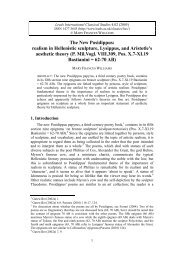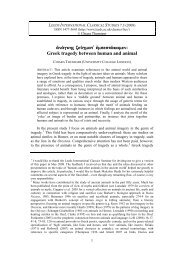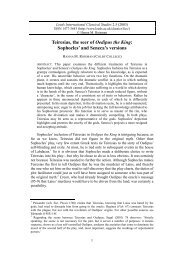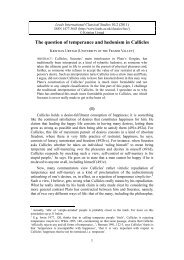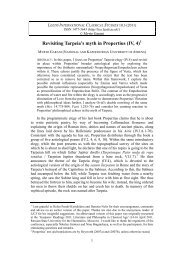'And bright was the flame of their friendship' - Leeds International ...
'And bright was the flame of their friendship' - Leeds International ...
'And bright was the flame of their friendship' - Leeds International ...
You also want an ePaper? Increase the reach of your titles
YUMPU automatically turns print PDFs into web optimized ePapers that Google loves.
GORDON CAMPBELL, ‘AND BRIGHT WAS THE FLAME OF THEIR FRIENDSHIP’<br />
aut genus humanum iam tum foret omne peremptum<br />
nec potuisset adhuc perducere saecla propago.<br />
Then, after <strong>the</strong>y had got huts and skins and fire for <strong>the</strong>mselves, and woman<br />
joined to man had retired into a single marriage, and <strong>the</strong>y saw children created<br />
from <strong>the</strong>m, <strong>the</strong>n it <strong>was</strong> that <strong>the</strong> human race first began to s<strong>of</strong>ten. For fire saw to<br />
it that <strong>the</strong>ir now tender bodies were unable to bear <strong>the</strong> cold under <strong>the</strong> open sky as<br />
<strong>the</strong>y had before, and Venus lessened <strong>the</strong>ir violence, and children with <strong>the</strong>ir<br />
winning ways easily broke <strong>the</strong> arrogant nature <strong>of</strong> <strong>the</strong>ir parents. And <strong>the</strong>n eager<br />
neighbours began to form friendship pacts with one ano<strong>the</strong>r nei<strong>the</strong>r to harm nor<br />
be harmed, and <strong>the</strong>y entrusted children and <strong>the</strong> female race to each o<strong>the</strong>r’s care,<br />
signing with cries and halting gestures that it is right for all to pity <strong>the</strong> weak. It<br />
<strong>was</strong> not possible however for complete concord to arise, but a great part kept <strong>the</strong><br />
pacts with integrity, or already at that time <strong>the</strong> human race would have been<br />
completely destroyed, nor would <strong>the</strong>ir <strong>of</strong>fspring have been able to prolong <strong>the</strong><br />
race to this day.<br />
The pacts made between humans are, unsurprisingly, more formal and<br />
detailed than those made between humans and animals; <strong>the</strong> substance <strong>of</strong> <strong>the</strong><br />
human pacts is indeed described in a translation <strong>of</strong> Epicurus’ own words ‘nei<strong>the</strong>r<br />
to harm nor be harmed’ (KD 33), and <strong>the</strong>y even result in a claim that seems to go<br />
beyond what Epicurus himself would allow, stating that it is ‘right for all to pity<br />
<strong>the</strong> weak’. 42 These differences aside however, <strong>the</strong> picture is quite similar, and we<br />
see men entrusting (commendarunt, 1021) women and children to each o<strong>the</strong>r’s<br />
care just as <strong>the</strong> animals were entrusted (commendata, 861, cf. tradita, 867) to<br />
human care. Although <strong>the</strong> pacts were made between <strong>the</strong> men in order to protect<br />
third parties (<strong>the</strong> women and children), <strong>the</strong> animals, we must assume, were<br />
‘entrusted’ in <strong>the</strong> sense that <strong>the</strong>y entrusted <strong>the</strong>mselves to human care. 43 Fur<strong>the</strong>r,<br />
<strong>the</strong> neighbours are keen for <strong>the</strong> pacts (aventes, 1019) just as <strong>the</strong> animals eagerly<br />
(cupide, 868) sought safety and fodder. We are not told <strong>of</strong> <strong>the</strong> changes that<br />
animals have undergone by being tamed and domesticated, but <strong>the</strong> description <strong>of</strong><br />
<strong>the</strong> s<strong>of</strong>tening undergone by <strong>the</strong> early humans in response to <strong>the</strong>ir environment is<br />
clearly a form <strong>of</strong> taming and domestication. 44 It is also specifically stated that had<br />
<strong>the</strong> early humans not formed <strong>the</strong>se pacts and kept <strong>the</strong>m (for <strong>the</strong> most part)<br />
faithfully, <strong>the</strong> human race would have gone extinct (1024-7). Just so we are told<br />
that domestication saved some animal species from extinction (860-1, cf. 871-77).<br />
42 See Campbell 2002.<br />
43 Sorabji 1993, 163, compares Jan Narveson’s <strong>the</strong>ory (1977) that a contract made between adults<br />
to protect each o<strong>the</strong>r’s children could be extended to include <strong>the</strong> protection <strong>of</strong> each o<strong>the</strong>r’s<br />
livestock as well. Lucretius, however, presents <strong>the</strong> pact being made directly between humans and<br />
animals.<br />
44 Cf. <strong>the</strong> comparison between <strong>the</strong> first humans and bristly wild boars at 5.970 (saetigerisque pares<br />
subus) which suggests that humans have become less hairy since <strong>the</strong>ir ‘domestication’ just as<br />
domestic pigs have lost most <strong>of</strong> <strong>the</strong>ir bristles. Cf. also <strong>the</strong> zoomorphism <strong>of</strong> <strong>the</strong> description <strong>of</strong><br />
domestication <strong>of</strong> crops in 5.1368-9: <strong>the</strong>y are ‘wild fruits’ that are ‘tamed’ and ‘indulged’ and<br />
‘sweetly cultivated’ as if <strong>the</strong>y were animals being tamed: fructusque feros mansuescere ... |<br />
indulgendo blandeque colendo. Cf. <strong>the</strong> intertexts in Virgil Georgics 2.49-62, where grafted trees<br />
lose <strong>the</strong>ir ‘woodland spirit’ (silvestrem animum, 51) and learn to practise arts (artes, 53) as if <strong>the</strong>y<br />
were Lucretius’ first humans leaving <strong>the</strong>ir woodland haunts and settling down.<br />
18


